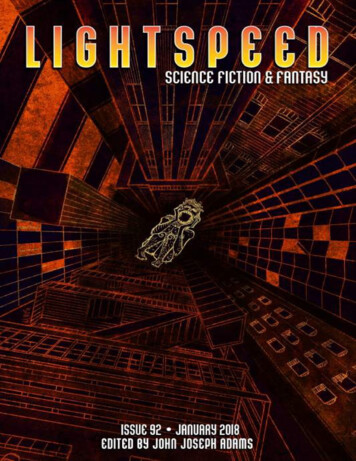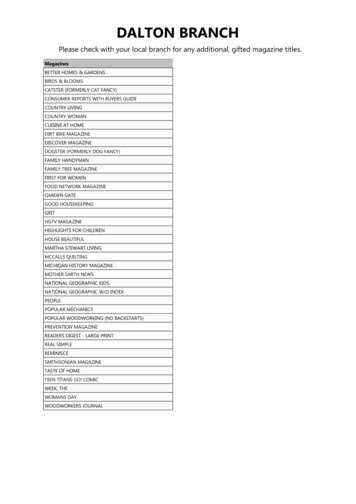
Transcription
TABLE OF CONTENTSIssue 92, January 2018FROM THE EDITOREditorial: January 2018SCIENCE FICTIONThe Streets of BabelAdam-Troy CastroGolubash, Or Wine-Blood-War-ElegyCatherynne M. ValenteThe Eyes of the FloodSusan Jane BigelowSomedayJames Patrick KellyFANTASYAuburnJoanna RuoccoThe Substance of My Lives, the Accidents of Our BirthsJosé Pablo IriarteDivine MadnessRoger ZelaznyThe Court MagicianSarah Pinsker
NOVELLAA Thousand Nights Till MorningWill McIntoshEXCERPTSJonathan Moore The Night MarketJonathan MooreNONFICTIONBook Reviews: January 2018Christie YantMedia Reviews: January 2018Christopher EastInterview: Fonda LeeChristian A. ColemanAUTHOR SPOTLIGHTSAdam-Troy CastroJosé Pablo IriarteSusan Jane BigelowSarah PinskerMISCELLANYComing AttractionsStay ConnectedSubscriptions and EbooksAbout the Lightspeed TeamAlso Edited by John Joseph Adams
2017 Lightspeed MagazineCover by Alan Baowww.lightspeedmagazine.com
Editorial: January 2018John Joseph Adams 1540 wordsWelcome to issue ninety-two of Lightspeed!Our cover art this month is by Alan Bao, illustrating a new science fictionshort by Adam-Troy Castro (“The Streets of Babel”). Susan Jane Bigelow gives usour other piece of original SF (“The Eyes of the Flood”). We also have with SFreprints by Catherynne M. Valente (“Golubash, or Wine-Blood-War-Elegy”) andJames Patrick Kelly (“Someday”).Our fantasy originals are from José Pablo Iriarte (“The Substance of My Lives,The Accidents of Our Birth”) and Sarah Pinsker (“The Court Magician”). Ourfantasy reprints are by Joanna Ruocco (“Auburn”) and Roger Zelazny (“DivineMadness”).All that, and of course we also have our usual assortment of author spotlights,along with our book and media review columns, and an interview with authorFonda Lee.For our ebook readers, our exclusive novella is by Will McIntosh (“AThousand Nights Till Morning”). And of course we have a book excerpt just forour ebook readers, too—it’s a snippet from The Night Market, by JonathanMoore.John Joseph Adams Books News for January 2017One new acquisition to report:Micah Dean Hicks’s Break the Bodies, Haunt the Bones, a debutnovel in which dangerous machines and unnatural beastmenmysteriously arrive in a dying town already filled with ghosts, forcinga haunted brother and sister to figure out how to save their familybefore tortured spirits tear the town and the newcomers apart. (Spring2019)Aside from new acquisitions, here’s a quick rundown what to expect fromJohn Joseph Adams Books in 2018:In April, we have Bryan Camp’s The City of Lost Fortunes, about a magicianwith a talent for finding lost things who is forced into playing a high stakes gamewith the gods of New Orleans for the heart and soul of the city. Here’s some early
buzz for the book:“Camp’s fantasy reads like jazz, with multiple chaotic-seeming threadsof deities, mortals, and destiny playing in harmony. This game ofsouls and fate is full of snarky dialogue, taut suspense, and characterswhose glitter hides sharp fangs. [. . .] Any reader who likes fantasywith a dash of the bizarre will enjoy this trip to the Crescent City.” —Publishers Weekly“Take a walk down wild card shark streets into a world of gods, lostsouls, murder, and deep, dark magic. You might not come back fromThe City of Lost Fortunes, but you’ll enjoy the trip.” —RichardKadrey, bestselling author of the Sandman Slim series“In The City of Lost Fortunes, Bryan Camp delivers a high-octane taleof myth and magic, serving up the best of Neil Gaiman and RichardKadrey. Here is New Orleans in all its gritty, grudging glory, the hauntof sinners and saints, gods and mischief-makers. Once you pay a visit,you won’t want to leave!” —Helen Marshall, World Fantasy Awardwinning author of Gifts for the One Who Comes After“Bryan Camp’s debut novel The City of Lost Fortunes is like a blessedstay in a city both distinctly familiar and wonderfully strange, with anold friend who knows just the right spots to take you to–not tootouristy, and imbued with the weight of history and myth, populatedby local characters you’ll never forget. You’ll leave sated with thesights and sounds of a New Orleans that is not quite the real city, butbreathes like the real thing, a beautiful mimicry in prose that becomesits own version of reality in a way only a good story—or magic—can.You won’t regret the visit.” —Indra Das, author of The Devourers“With sharp prose and serious literary chops, Bryan Camp delivers amasterful work of contemporary fantasy in The City of Lost Fortunes.It reads like the New Orleans-born love child of Raymond Chandlerand Neil Gaiman, featuring a roguish hero you can’t help but root for.It’s funny, harrowing, thrilling—the pages keep turning. The City ofLost Fortunes establishes Bryan Camp as the best and brightest newvoice on fantasy literature’s top shelf.” —Nicholas Mainieri, author ofThe Infinite“Anyone who loves New Orleans will love this mystical adventurewhere gods, magicians, vampires, zombies, angels, and ghouls clash
in the only city where a story like this is actually possible. The City ofFortunes expertly blends the real and the surreal, capturing theessence of New Orleans in such a unique way. In this city, just as inthis story, the line between fact and fiction blurs, and your imaginationis set free.” —Candice Huber, Tubby and Coo’s Bookstore (NewOrleans, LA)“Myth and archetype combine with the gritty realism of modern postKatrina New Orleans in this fast-paced novel. Throughout the twistsand turns of a clever, compelling plot, the soul of the city and strengthof its survivors shine through. As a southern Louisiana resident,Bryan Camp saw firsthand the devastation and impact on people’slives caused by Katrina, and the emotion of that experience fuels thepower of the story and its unique, well-crafted characters. If you likethe work of Neil Gaiman and Roger Zelazny, you’ll enjoy this book. Afun, engaging read. Highly recommended.” —Les Howle, director ofthe Clarion West Writers WorkshopIn June, we have Todd McAulty’s The Robots of Gotham, a debut novel abouta future where the world is on the brink of total subjugation by machineintelligences when a man stumbles on a sinister conspiracy to exterminatehumanity and a group of human and machine misfits who might just be able toprevent it. Here’s what some early readers are saying about this one:“When the robot apocalypse comes, I hope it’s this much fun. LikeThe Martian and Ready Player One, Robots of Gotham is set in ahigh-tech near-future where something has gone terribly wrong, andit’s navigated by a hero who’s quirky, resourceful, and as likable asthey come. Read it for the rock’em-sock’em-robot action—read it forthe deft world-building with its detailed taxonomy of intelligentmachines—read it for the sobering parallels to modern-day issues andthreats. Or just read it because it’s a helluva good ride.” —SharonShinn, author of the Elemental Blessings series“The Robots of Gotham is a crackling good adventure, stuffed withcool action sequences. It also features serious and intriguingspeculation about the potential of Artificial Intelligence, for good andbad. And it’s an engaging read, with absorbing characters, and, ofcourse, lots and lots of nifty robots.” —Rich Horton, editor of The
Year’s Best Science Fiction & Fantasy“Todd McAulty has imagined a fascinating geopolitical future, filled itwith some very cool technology, and thrown in healthy helpings ofintrigue and action. The result is a page-turner that kept me rivetedfrom the opening lines to the final chapter. Highly recommended!” —David B. Coe, author of The Case Files of Justis Fearsson“If Johnny 5 had a baby with the Terminator, the result would beRobots of Gotham: a book that explores the consequences of worlddomination by our Robot Overlords. (And, lest we forget thebadassiest of them, our Robot Overladies.) Drones, dinosaurs, anddoggies—with a plague thrown in for good measure!—the barter isbanter, and death is cheap. With man against machine, machineagainst machine, man against man, unlikely alliances must be forgedacross all species, rational or otherwise. For all its breakneck worldbuilding, constant questing, and relentless wheeling and dealing,Robots of Gotham is deceptively deep-hearted: a novel about, of allthings, friendship.” —C.S.E. Cooney, author of World FantasyAward-winning Bone Swans: Stories“Soldiers, spies, diplomats—and that’s just the machines. Wait untilyou meet the wise-cracking hero and his dog. Wildly inventive,outrageous fun.” —Kay Kenyon, author of At the Table of Wolves andSerpent in the Heather“Adventure, mystery, action, sinister intrigue, clever heroics, androbots—what more do you need? I couldn’t put it down.” —HowardAndrew Jones, author of The Desert of SoulsFurther out in 2018, we’ll have The Wild Dead—Carrie Vaughn’s sequel toBannerless—in July; Dale Bailey’s In the Night Wood in October; and then MollyTanzer’s Creatures of Want and Ruin in November. We’ll provide more detailsabout those as the publication dates draw nearer, but as always if you want moreinformation about these or any other John Joseph Adams Books titles, just visitjohnjosephadamsbooks.com.That’s all the JJA Books news for now. More soon! Well, that’s all there is to report this month. Thanks for reading, and I hope
you enjoy the issue!ABOUT THE AUTHORJohn Joseph Adams, in addition to serving as publisher and editor-in-chief of Lightspeed, isthe editor of John Joseph Adams Books, the SF/Fantasy imprint from Houghton Mifflin Harcourt.He is also the series editor of Best American Science Fiction & Fantasy, as well as the USAToday bestselling editor of many other anthologies, including The Mad Scientist’s Guide toWorld Domination, Robot Uprisings, Dead Man’s Hand, Armored, Brave New Worlds,Wastelands, and The Living Dead. Recent projects include: Cosmic Powers, What the #@&%Is That?, Operation Arcana, Loosed Upon the World, Wastelands 2, Press Start to Play, andThe Apocalypse Triptych: The End is Nigh, The End is Now, and The End Has Come. Called“the reigning king of the anthology world” by Barnes & Noble, John is a two-time winner of theHugo Award (for which he has been a finalist eleven times) and is a seven-time World FantasyAward finalist. John is also the editor and publisher of Nightmare Magazine and is a producerfor Wired.com’s The Geek’s Guide to the Galaxy podcast. Find him on Twitter@johnjosephadams.
The Streets of BabelAdam-Troy Castro 6700 wordsThe city surrounded him while he slept. He had been fleeing it for four days.Long before its walls became visible, it was a grayish smudge on the horizon,beneath which the air shimmered in silent testimony of its radiant heat. It was oneof about ten living cities he knew of and he had avoided it for as long as hecould, staying out of their usual migratory paths, contenting himself with thecompany of the small tribes who had also managed to keep out of the reach of thecities, living on roots and the small animals that fell to his bow. For years he hadmanaged to go months at a time without even laying eyes on any of the cities, andhad even managed to pretend to himself that they didn’t exist, that it was possibleto live indefinitely without ever finding himself a resident of one.When he saw the smudge in the distance, he just changed course and headedin the opposite direction, figuring that it hadn’t sensed him. But then it followed,extending its pseudopods of brick and steel and pavement into the grass in itspath, pulling itself out of the ruined landscape it left behind, its shifting skylinegradually becoming sharper and more visible as it literally gained ground, in adetermined pursuit that no barefoot man, no matter how tireless or swift of foot,
could possibly evade. After one day, he knew that it was after him; after two days,he knew that he was doomed to capture; after three, he gave up all stops for restor sustenance; after four, he breathed in ragged gasps, in terror of the hungrysounds that grew louder, ever louder, just behind him.When he finally collapsed, his only hope was the forlorn one that it mightdecide that it did not want him after all. But as he slept, a pair of brick walls rosefrom the dirt on either side of him, forming an alley, and at the end of the alleythe grass withered to make room for the sidewalk, and just beyond the sidewalkthere came a street, and soon buildings, and finally, as the sun rose, people,fleeing whatever the city concocted to drive them wherever it wanted them to go;entire multitudes of them, already trapped and imprisoned and terrified andenslaved to its whims.The sleep the city provided him was not enough to counter his exhaustion. Hedid not hear the brick wall rise behind him, turning his alley into a blind one, andhe did not register when that wall began to slide forward, nor even when it waspressing against his back.When it began to shove him across the filthy, somehow already garbagestrewn concrete, he mumbled and muttered and attempted to hold on tounconsciousness a little while longer, but then it picked up speed and he felt theheat of that abrasive ground against his skin.He scrambled to his feet, saw with fresh dismay that the worst had finallyhappened, that the city had him, and for a moment or two just stood before theadvancing surface with the paralysis of all those faced with the knowledge thatthey no longer belong to themselves. Then the wall jerked forward, striking himin the face in what amounted to a stern reminder that he was not in charge. Hisnose bled. He backed up, looked around for his bow, saw that it had been halfswallowed up by the wall, considered trying to retrieve it anyway and then gaveup, heading for the alley’s mouth, which started sealing up even as heapproached.The city had no intention of crushing him between the wall advancing on himfrom behind and the one that was forming, brick by brick, ahead of him. Beforehe even had a chance to fear that fate, the wall to his left began to rise, grantingthe building on that side an extra two stories and not incidentally providing himwith a door that rose from the ground with it. Dented and grimy and shining ayellow light through its upper panel of fogged glass, it swung open at the lightesttouch, revealing a set of narrow stairs leading upward. He had just enough time toduck into the opening before the alleyway was swallowed up behind him. He
climbed the stairs just ahead of the advancing wall that ate up every riser at theinstant he no longer needed it, and reached a dim hallway to nowhere with onemore door at the midway point.This he went through, to find a cramped little apartment with ugly wallpaperand a flickering lamp and a sooty window looking out at the city. Uponinvestigating the view, he found out that he was much higher up than he shouldhave been after climbing only one flight, but the floor was still ascending, and asit achieved an altitude higher than that of the surrounding buildings he was able tolook out upon the cityscape and confirm that he was now fully encircled, the gridof its streets extending for miles before the advancing membrane that was the city,claiming more territory for itself. He could just barely make out grasslands in thefar distance, but they were clearly lost to him. No man could head for theoutskirts of a city in the face of all the opposition the city would place in his pathand hope to exit unless it wanted him to go; not even if he ran like the wind.Then a gleaming glass skyscraper erupted upward and erased his view,providing him instead with a mirror reflection of the building in which he wasnow imprisoned, a dull gray monstrosity with gargoyles and cornices and, there,his own naked and blurry form, standing at one window looking out: a man in abox that was just like all the other boxes around it, which were themselvescontained in a building that was a stack of boxes. He was not the only one lookingout, he saw; there were similarly forlorn figures in the windows above and belowhis, though it was possible to look past them to the patterned walls of thechambers in which they were trapped and see that those walls had advanced morecruelly than his own, effectively pinning them against the glass. He took from thisthe lesson that the city could always punish him for not hurrying in whateverdirection it wished to hustle him. It could make of him even more confined aprisoner than he was now.He looked down at the streets and saw hundreds of people, heading in alldirections, their clothing differing from those that surrounded him in only theslightest details. Most were hurrying, and looked like they were used to hurrying,the sidewalks nipping at their heels with little bulging ripples that pursued themand drove them forward, on whatever errands the city found fitting for them.There were collisions: one rebounding against another, others colliding head-on,trying to avoid a direct confrontation whenever possible, except in those caseswhere, clearly, the city wanted them to fight. One man hesitated for some reasonknown only to him and the pavement reared up on all sides of him, forming anegg-shaped protrusion that sat undisturbed for a moment before it sank down into
the earth, taking that unfortunate pedestrian into the depths. Whether he’d justbeen devoured or was simply being shuffled to some other location at the city’sbehest was impossible to say. Either way, nobody around him had the time tonotice. They had their own errands, their own destinations, whether known tothem or not.His window tilted sideways, becoming a parallelogram that blinked like an eyeand was gone. The wallpaper bubbled, lost its pattern, and became tile. A drainopened up in the floor, between his bare feet. Hot water showered down on him.He found soap in a dish that wasn’t there before, was gifted with the knowledgeof its purpose, and lathered up, turning his face toward the spray. It tasted bad. Itwas water and it was hot but it had a nasty, rusty quality, as if the city was nowsick in some way, and the sickness was carried by the very pipes. He still tookpleasure in cleaning himself. He was a man who had avoided the company ofother men for much of his life, a man who for months out of the year slatheredhimself with grease to protect himself from the insects that at some times coveredthe grasslands in swarms like black clouds, a man who only rarely had cause toconsider his own stench, but the city would not allow him to persist in suchunsanitary habits and had now afflicted him with the awareness that here he wasexpected to do better. So he washed, and the water puddling at his feet turned firstblack, then brown, then clear, before the water stopped without any input fromhim. He felt disappointed. It had been pleasurable.He left the shower, instantly dry, and the room shifted again, becoming a closetwith many identical hanging outfits. After some trial and error, he figured outhow to put on the white shirt and the gray slacks, but the city grew impatient withhis dawdling and a red tie burst from a hanging rack of identical ties and wrappeditself around his neck, like a constricting snake. Further firm guidance providedhim with shoes, a jacket, and a brimmed hat, which adjusted itself for size beforethe apartment constricted and forced him back into the hallway, which itselfconstricted and forced him down the stairs to the street.By the time he had joined the flow of humanity his neighborhood did not lookthe same as it had when he’d viewed it from the window. The buildings hadbecome squatter, the avenues narrower. The gleaming glass towers had becomesmaller buildings with storefronts, each identified with lettering in a language hewas disturbed to discover he could read. One place provided clothing of a sortsomewhat different than the outfit he wore, another produced music, a thirdintoxicating beverages, and a fourth hot food, which it occurred to him that hewanted; but when he hesitated at the enticing scent that came from that one open
doorway, the pavement at his feet pricked him with fangs of stone and he wasdriven onward, forced to ignore the stabbing pains in his feet.He picked up the pace and saw that he was approaching a corpse lying half inand half out of the gutter, the upper half of his head flattened as if from theimpact of some falling object, but there was no object and the source of theunfortunate’s wound remained mysterious. Every impulse in his own bodyargued that he should slow down, kneel before this victim of the city’s arbitrarypace, and show the respect that such a tragedy deserved, but the little rippleguiding him onward would not have it, and so he found himself stepping over thebody, ignoring it, leaving it behind for someone else to deal with. Everybodyaround him did the same thing. He wanted to ask them whether it was always likethis, but he was not given enough time for such a conversation; he was just drivenon, down that street and left onto another and then right onto still another, thepace picking up, the sense of urgency growing.After hours of this, which amounted to nothing more than walking in circles asfar as he could see, he was directed toward one of the storefronts and into a roomlined with shelves on which sat dusty glass jars bearing liquids of varying colors,which might have been balms or beverages or any other damned thing, not that itmattered, because he was no more than four steps into the room before the wallsswallowed the containers and the shelves became bare. The room darkened butfor a wedge of light leading to a brightly lit hallway in the back, and he headedthat way, hoping at least for some point to the long day of racing around like afool, but the hallway turned out to be almost the length of a city block itself, andhe had enough time to despair of any such conclusion before he emerged into aroom where many different men and women sat typing at workstations.No sooner did he rest his weight on the unoccupied chair than cubicle wallssprung up, and up, and up, four of them, rising to the tiled ceiling and thusshutting him in with nothing to do but respond to the machine’s demands of him.It was a minor math problem. He was not a man who had ever had any real usefor numbers, had indeed been so primitive that he’d never had any need tounderstand any more than he could count on his fingers on toes, but now survivaldictated that he cooperate. So he did the problem, using the keys on the devicebefore him to make the same numbers appear on the glowing screen he’d beenprovided, complete with answer. Another problem appeared. He solved that one,and the one that came after that, and the one that came after that, hundreds, itseemed, in rapid succession, all pointless, all coming faster the better he becameat answering them.
Only gradually did he become aware that his hands were now shackledtogether and to the table surface and that he grew unpleasantly warm when heattempted to take a break for himself. Only a little while after that he found thathe needed to relieve himself and had no means of satisfying that need withoutdisgrace. He could only hold it in and continue what he was doing until the citydecided that it could afford him the privilege.By the time the walls lowered around his workstation, his cramps werehorrific. He fled ahead of the city’s prodding and found the same room thateverybody else was fleeing for, where by heroic effort he managed to deny hispressing need until those in front of him were done. An empty space opened upfor him. He sat and did what he had to do, feeling a vast nostalgia for the free lifehe had lived up until a few days ago. He wanted to linger. But he was presentedwith the knowledge that he had to go back to his little cubicle and return toinputting his numbers, so he got up, washed his hands as per the city’s wishes,and went back to multiple hours trapped in an activity he found nonsensical andwithout merit, wondering if there would ever come a time when he could eat,when he could sleep, when he could scratch his ass without interference.The answer, it turned out only when he had worked to a time that he couldonly think of as eventually, was “yes.” The glowing screen receded into hiscubicle wall and he prepared himself to be released, but it seemed that the city didnot want to him to exit on his own two feet, not at all. It would take care ofmoving him. His desk remained in place, but his chair descended through whatseemed like an endless vertical shaft, while he pounded at the walls. Then thechair tilted forward and deposited him into a chute, which he slid down atdizzying speed until he found himself on the sidewalk again, driven forward, everforward, through mobs of terrified others.He had returned his thoughts to whether the city ever had any intention offeeding him when the pavement nipping at his heels steered him to his left into astorefront, which turned out to be a place for the distribution of food. The lightswere down lower than made sense. The little tables were all covered withtablecloths. There were people seated at the tables, two at each, all jittery. Therewere women with men, men with men, women with women, and one table wherea single woman sat, her eyes little circles in which smaller circles bounded about,as if searching for a means of escape. He was prodded to the other side of thattable. A chair popped out of the floor, jabbing at his thighs and demanding hisoccupancy. He collapsed into it with an audible whuff, whereupon a strapwhipped across his midsection, buckling him in.
The city spoke to him. “This is your wife.”This was the strangest thing of all, because while such pairings were notunknown in the tribes that roamed the grasslands, it was normally expected thatmates were provided at least a little basic familiarity with one another before anyformal connection was declared. But the city didn’t have time to waste on suchfolderol. It needed him paired with her, just as it needed all these other peoplepaired with the other strangers sitting across from them, and it was not willing tobrook argument.So he offered a little crooked half-smile as apology and she offered the same,though there was more resignation in her expression than he would have liked.She uttered a number of words in a language he didn’t know, that to him soundedlike she’d stuffed her mouth with pebbles and was gagging on them. He spoke toher in his own tongue, a businesslike dialect of few words and no appreciablepoetry that had always gotten right to the business of whether anybody in theimmediate vicinity knew how to make fire and where all the tastiest grubs were.She grimaced at the sounds coming out of his mouth. Whatever she said nextremained a mystery to him, but was clearly not very nice. Whatever calculus sheused to define the attractiveness of males, he clearly did not add up to very much.This was also a familiar situation to him, unfortunately. The sad thing was that byhis own matching calculus she really wasn’t all that bad, her specific allotment offacial features combining to convey what would have been an invitingimpression, if she wasn’t so scared and despairing and pissed off. But her hairwas ridiculous. It was all combed and shiny.A pair of swinging doors slammed open in the rear of the chamber and aparade of men and women in identical outfits burst in at the hurried pace ofantelope being driven off the edge of a cliff. They were all carrying trays of food,which they dropped off at every table in the room before the floor ushered themall back out of an exit that sealed behind them. The meals appeared to be cookedmeat, covered with some kind of sauce. There were also vessels filled with water.His wife, ravenous, grabbed the slab of meat with both hands, jamming it into hermouth as if experience had taught her that taking any more time with it risked itsremoval before she’d had enough. He followed her example, digging into his owncourse, and discovering within his very first few bites that whatever the city did inorder to prepare food also robbed it of everything that made food pleasurable. Itwas like chewing on sand, and he almost choked on it before sternly advisinghimself that if he wanted to live he should take what was offered.He ate four bites and he gulped a taste or two of the water before a bell rang
and the chairs belonging to every diner all swiveled on their axes and slid forwardon invisible tracks, forming a train that proceeded single-file through a freshopening in the wall, where they chugged along for a while until the couples beganto peel off into side passages. The ride was bumpy and the resulting motionsickness almost made him lose his meal, before the chairs tipped forward andejected him and his wife onto a bed large enough for the two of them.If they were meant to mate now, the city needed a little refresher course inwhat put human beings in the mood, because his wife still wanted nothing to dowith him. She recoiled and hissed at the sight of him, retreating as far as shecould without leaving the mattress, not that she could because it was precisely thesame size as the surrounding chamber and there was no place for her to go exceptback up the chute, which closed too quickly for her to do such a thing. He did notpursue her. He was still too dazed from his first city to exercise any carnal urges,and indeed wanted nothing more than to pass out and sleep for however long thecity would permit unconsciousness.But sleep was still not on the agenda, it seemed: not with the rectangular screendescending from the ceiling and positioning itself where he and his wife had nooption other than looking at it. The first projected images were of people, doingthings around the city; people of extraordinary health and charisma, rushing aboutat the same pace he had been rushed through his day, except out of what in theircase appeared to be personal volition. They had purpose and they had urgencyand they emoted the impor
the Clarion West Writers Workshop In June, we have Todd McAulty's The Robots of Gotham, a debut novel about a future where the world is on the brink of total subjugation by machine intelligences when a man stumbles on a sinister conspiracy to exterminate humanity and a group of human and machine misfits who might just be able to prevent it.











